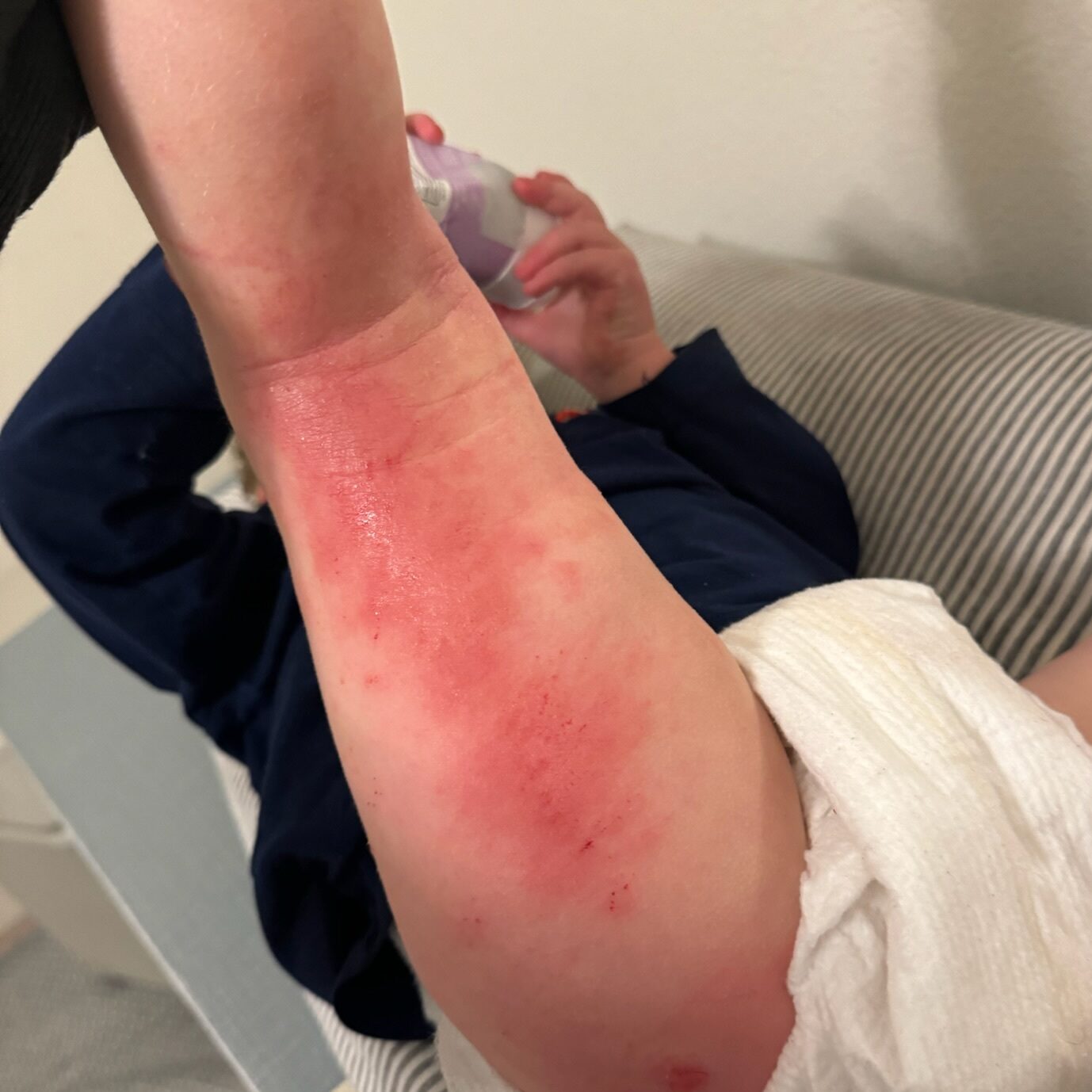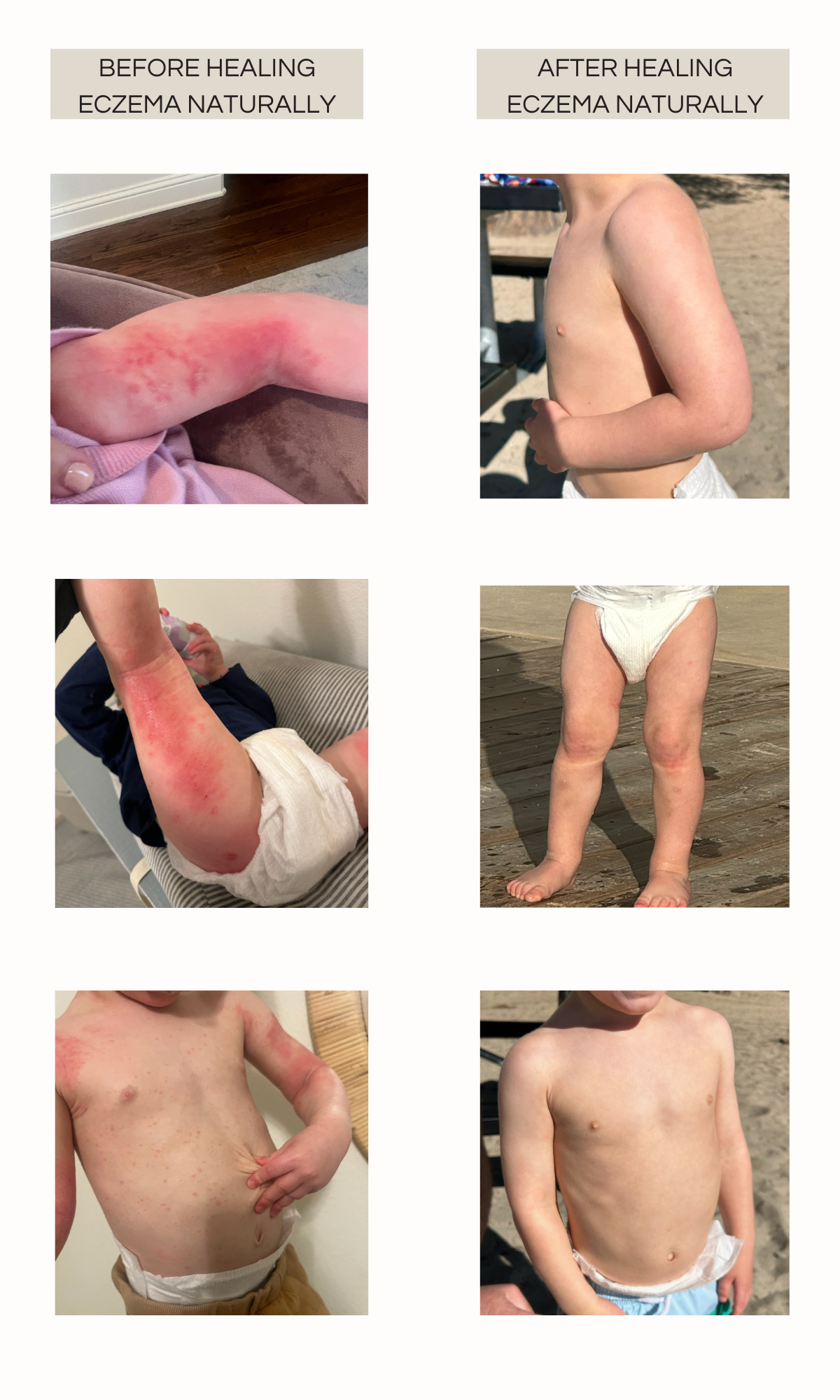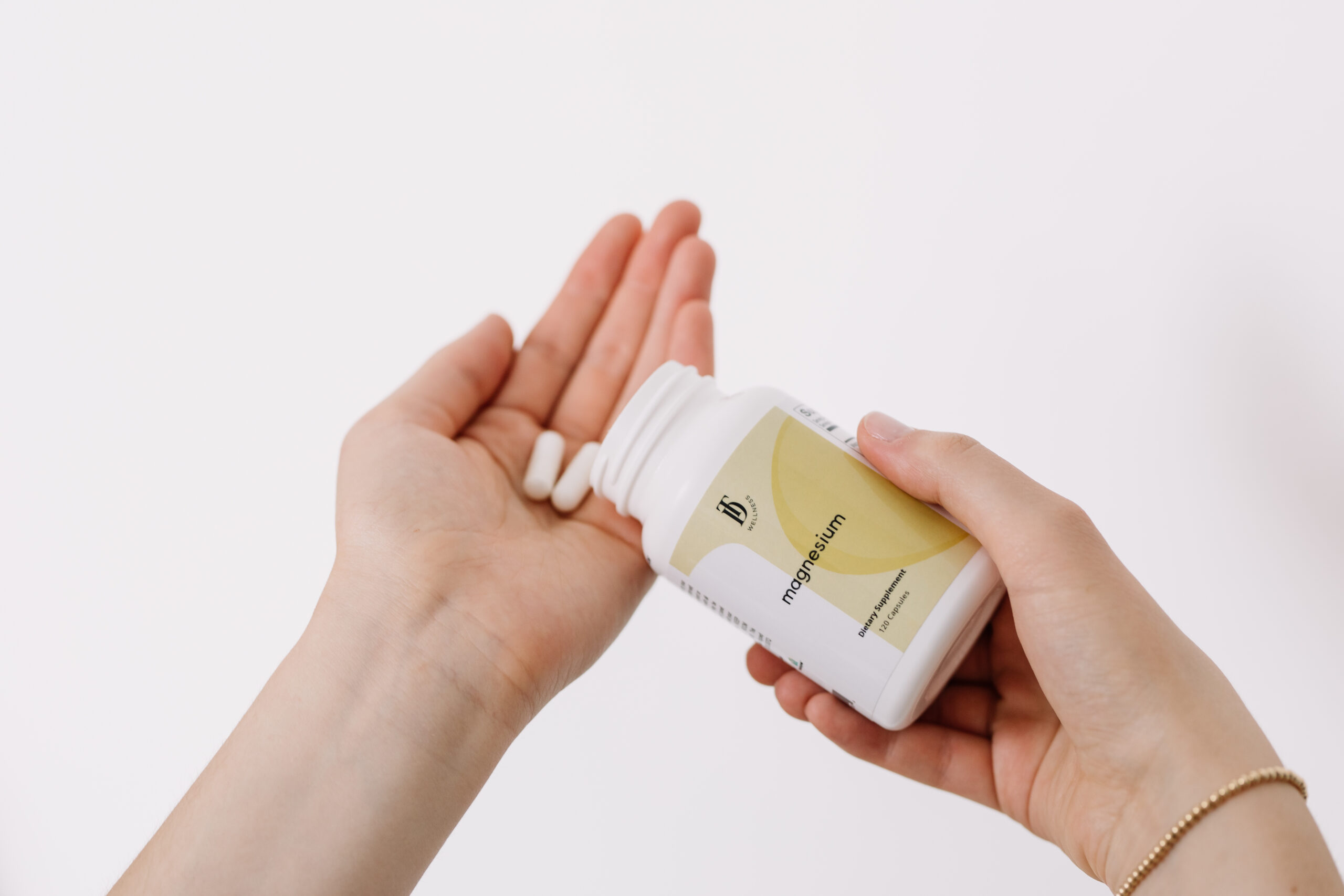How to Naturally Heal Eczema

If you or a child have ever struggled with eczema, then you know how frustrating, emotional, and confusing it can be…And it may leave you wondering if it’s really possible to naturally heal eczema.
I understand, and my heart feels for yours. As a functional medicine nurse practitioner, I’ve been there with my own children. Red, inflamed itchy patches of skin in his elbow creases and legs and little red dots on his trunk led me down the rabbit hole of gaining a better understanding of this skin condition. And more importantly, what we can do to naturally heal from it.

The functional medicine approach to eczema is different from the conventional medicine approach. Instead of focusing on steroids and topical creams, functional medicine providers look deeper at the cause(s) behind eczema and seek to facilitate healing from the root. It’s an inside-out approach.
What is eczema?
Eczema, sometimes called atopic dermatitis, is a skin condition that causes dry, itchy, scaly, and/or inflamed patches of skin. It’s a common condition, and it isn’t contagious. Eczema can flare when it comes into contact with some sort of irritant or allergen. Adults and children alike can struggle with eczema.
Symptoms of eczema can include:
- Itchiness
- Swelling
- Dryness
- Redness
- Stinging/burning
- Thickened skin that can become scaly/leathery over time
- Small, rough bumps
Eczema is a symptom telling you that some sort of inflammation exists in the body. We must investigate what is causing the inflammation. Knowing what triggers eczema is key to healing the gut and healing it for the long haul.
Why take a root cause approach to healing eczema?
1. Topical steroids and creams won’t heal eczema for good.
If you only place a band-aid on your eczema (using topical creams and ointment), you aren’t actually healing the real issue going on. It’s just a matter of time before symptoms appear again and sometimes steroids can thin the skin and further exacerbate sensitivity. While eczema may not be life-threatening, it’s hinting that there are imbalances in your body. If you leave them unaddressed, those imbalances and dysfunctions can lead to more serious chronic illnesses.
2. A root-cause approach addresses the greater problem: systemic inflammation.
Eczema is a skin disease caused by inflammation and/or imbalance in the body. And oftentimes, the immune system is to blame. The immune system can be over-reactive to all sorts of “causes” (we’ll discuss below), which leads to chronic inflammation, compromised skin barrier, gut issues, and eventually eczema.
Addressing whatever is causing the inflammation or imbalance, and restoring normal function to the immune system, will not only improve the health of your skin, but the overall well being of your body.
What causes eczema?
Eczema is most often multifaceted. There is typically more than one piece to the puzzle. It’s important to remember that eczema is a symptom. As stated above, eczema is an indicator of some type of inflammation or imbalance in the body. And there are many things that could be causing that inflammation/imbalance. In my professional experience, I often see these as the top factors contributing to the types of imbalance/inflammation that leads to eczema.
Sensitivities and Allergies
A food allergy or sensitivity can trigger eczema. Some of the common foods that cause eczema outbreaks are: seafood, nuts, dairy, gluten, soy, eggs, and alcohol. These foods may cause an immune reaction within the body that elevates inflammatory markers, triggering an eczema flare.
You can do lab testing (available and offered within the TDW Community, or with your functional medicine provider) to see whether or not you have any food allergies or sensitivities.
On a personal note, I want to point out that not all foods which are inflammatory to the body may show up on a lab test. As I mentioned before, my son was having eczema flares, and I felt like I tried everything! I even had him undergo a blood draw to test for food allergies (IgE) and he had none. I know through my practice that gluten and dairy are two big culprits and triggers of eczema, but given that he did not have an allergy, I was not overly strict about dairy when we ate out. We also did have high quality, grass-fed butter at home.
Despite his lab test showing he was not sensitive to dairy, It wasn’t until I decided to really crack down and pull the dairy altogether from his diet that his skin saw massive improvements. Just goes to show that sometimes it takes a little experimentation. We can’t go by labs alone. We have to look at how the body responds to certain foods/diets.
If you’ve tried everything, I’d suggest experimenting with an elimination diet and removing the top allergenic foods listed above completely. After a few weeks (remove for 21 days at the least, but 30+ days is optimal), you’ll be able to see if that helps!
In addition to food allergies and/or sensitivities, environmental allergies and/or sensitivities can be a large factor, too. This includes things like pollen and mildew as well as chemicals and synthetic compounds. Keep in mind that these types of allergens can be contained in laundry detergents, antibacterial sprays, cleaning products, personal care products, fragranced products and more.
Unhealthy/Inflammatory Diets and Nutrient Deficiencies
Processed foods, added sugars, artificial sweeteners, refined flours, chemicals, trans fats, additives, preservatives, pesticide residue, and MSG are some of the biggest offenders of inflammatory effects that may result in eczema.
While I suggest eating this way always, especially when trying to heal from inflammatory conditions such as eczema, it’s important to eat a real, whole food diet. Eliminate processed foods. Stick with clean animal proteins and products that grow from the ground or tree. This will do wonders in decreasing inflammation within the body.
It’s also important to note that nutrient deficiencies can contribute to eczema exacerbation. In particular, essential fatty acids, zinc, and vitamins A, D, and E are often low in those who struggle with eczema. If you’re interested in undergoing a comprehensive nutritional analysis, we have this lab available via the TDW Community (along with the option to schedule a 1:1 consult with a TDW healthcare team member to discuss results!).
Stress
Chronic stress chips away at health, including skin health. Even if you are eating all the right foods and using non-toxic products, stress can still be a huge driving factor of inflammation. When you’re stressed out, cortisol levels increase. This alters the effectiveness of cortisol to regulate both the inflammatory and immune response because it decreases tissue sensitivity to cortisol. This can lead to low-grade inflammation, which can contribute to eczema.
I want to remind you that children have things that tax their own nervous system that look very different from adult “stressors.” This includes things like overcommitment or sports, major life events, travel, lack of sleep, and even feeding off their parents’ stress. It’s true – if a parent is stressed out and having a difficult time regulating his/her nervous system, it will likely have some sort of an effect on the child.
Remember that stress can be both mental/emotional and/or physical. Even something like the stomach flu can trigger an eczema flare because it is a stress on the body, which increases histamine and suppresses the immune system.
We all have stress, and I want to acknowledge that it’s not a bad thing! And as parents, we cannot feel guilt or shame for showing some of that tension in front of our children. Here’s what’s important: practice and model positive stress management techniques in front of your child and even with your child! This is what can help regulate the nervous system, reduce inflammation, lower cortisol, and promote healing.
Poor Gut Health – Leaky Gut, Dysbiosis, Yeast and/or Fungal Overgrowth
An unhealthy gut can be due to 1) an unbalanced microbiome (overgrowth pathogens) or 2) a damaged gut lining. Eczema can manifest from either of these disruptions: barrier dysfunction and/or immune response.
Dysbiosis: Dysbiosis in the gut can contribute to inflammation and eczema. This is when there is a lack of healthy bacteria in the gut, encouraging harmful bacteria to flourish. Yeast and/or fungal overgrowth is also evidence of dysbiosis. Any type of dysbiosis can cause skin issues.
Keep in mind that a diet high in sugar, stress, and medications like antibiotics and NSAIDs can all contribute to dysbiosis. Parasites can also affect the immune system, the gut and eczema.
Leaky Gut: Your gut lining has tight junctions to keep unwanted particles inside the gut and allow smaller, necessary particles into the bloodstream to be delivered to cells. If you have increased intestinal permeability (aka leaky gut), your tight junctions become loose and damaged. This lets those unwanted particles into the bloodstream, activating an immune response and ultimately triggering inflammation. If you don’t heal a leaky gut, the body will continue to experience inflammation and eczema.
Toxins and Irritants
This includes things such as: environmental toxins, mold, and heavy metals. These are things we are exposed to toxins on a daily basis.
- Toxins include all sorts of chemicals found in home cleaning products, personal care products, lawn and home products, fragranced products and more. These are huge contributors to eczema flares. A non-comprehensive list of some of the offenders includes: amidoamine, bacitracin, benzalkonium chloride, benzophenones, black rubber, cinnamates, cocamidopropyl betaine, colophony (tree resin), diazolidinyl urea, dibenzoylmethanes, hydantoin, epoxy resin, formaldehyde, fragrance glyceryl, thioglycolate, imidazolidinyl, urea, lanolin, methyl methacrylate, methylchloroisothiazolinone, methylisothiazolinone, methyldibromo glutaronitrile, myroxylon pereirae (balsam of Peru), neomycin sulfate, octocrylene, paraben, para-aminobenzoic acid (PABA), paraphenylenediamine potassium dichromate, propylene glycol quaternium 15, salicylates, tixocortol pivalate, tosylamide, and formaldehyde resin. (source)
- Toxins are also in the foods we eat, the water we drink, and even on the clothes we wear. These toxins can enter the body and overload its detoxification processes, resulting in widespread inflammation. We can’t control everything and I don’t want you to live in fear but if you or someone you know is struggling with eczema, it would be wise to use 100% organic clothing while healing.
- Mold – both in the environment and in the body – can contribute to eczema. Mold spores in the environment can irritate the gut lining and cause inflammation, leading to eczema. After being exposed to mold, especially chronically, we can even develop mold infections within the body. This contributes to chronic, low grade inflammation, poor gut health, and all sorts of skin conditions including eczema.
- Heavy metals may also be a factor in eczema and other skin diseases. Lead has been found in higher concentrations in children with eczema. Copper and zinc are generally lower.
Genetic Predisposition
You are not destined to have eczema if your mother or father had it. However, you may be more predisposed. Especially if a mother has imbalances in her microbiome, Lyme, coinfections, etc. and has struggled with eczema in her past, it’s very possible to pass this propensity on to baby over the course of gestation/birth/breastfeeding.
Epigenetics is the intersection between genetics and your unique environment – the food you eat, activities you do, products you use, sleep you get, stress you have, etc. You may have heard that genetics load the gun, but our environment pulls the trigger. It’s true! Take heart that predisposition does not mean you’ll suffer from a certain genetic condition. You have a lot of influence via the decisions you make every day!
Parasites
Parasites may be a piece in the puzzle that leads to eczema. They can either be the reason for the cause of eczema, or at the very least, of its persistence. Parasites can contribute to eczema and systemic inflammation in a variety of ways: eating away at gut health, reducing immune function, and releasing toxic waste into the body. A parasite cleanse, such as what we did together within the TDW Community, would be a fantastic protocol to follow if attempting to heal from eczema.
Emotions and Trauma
Stick with me here. You might think that negative emotions or undealt-with trauma could have little effect on the body, but it’s simply not true. There is a strong neuro-emotional-skin connection! A research study found an increase in cases of eczema following acute trauma. It even found that the eczema may persist or recur for long periods of time. Emotions have such a strong influence on physical health, and negative emotions held within the body cannot be overlooked when healing from eczema.
How to naturally get rid of eczema:
If you’re ready to take action and make lifestyle changes to heal eczema from the root, here are some of my top suggestions and places to start:
- Investigate any underlying food allergies or sensitivities through testing.
There is a different between a food sensitivity (IgG) and a food allergy (IgE). Most providers will be willing to do a food allergy (IgE) panel but most are not familiar with food sensitivities. We offer this through the TDW Community, if you need access. It it a simple, one time finger prick at home test.
Even if your allergy testing comes up negative, if you have tried all other methods of improving eczema and still don’t see the results you want, it may be worth it to try an elimination diet where you cut out top allergen foods (seafood, nuts, dairy, gluten, soy, eggs, and alcohol) for a period of time to determine whether or not they have any sort of inflammatory effect. The two that I find most helpful to avoid are gluten and dairy.
Also, the NAET, or Nambudripad Allergy Elimination Technique, could be helpful for those who are struggling with a method and structure for eliminating allergens.
- Clean up your diet.
Try to consume as many whole, organic, and anti-inflammatory foods as possible. Avoid processed foods, especially those that are high in sugars, additives, and chemicals. Focus on anti-inflammatory foods such as deep-colored vegetables, berries, plenty of greens, and a variety of lower sugar fruits. Clean protein and healthy sources of fat like avocado, olive oil and wild-caught fish.
- Get rid of the toxins and irritants in your environment.
Swap out personal care products, house cleaning products, yard care products, and laundry products for non-toxic alternatives. I have a master list of my approved, effective, non-toxic products in just about every category available for you (for FREE!) right here.
One of the BIGGEST things you can do if you are struggling with eczema is switch to laundry detergent, body wash and lotion/cream that are clean. Here are some of my favorites:
- Natural laundry detergent like Branch Basics (Use code TAYLORDUKESWELLNESS for first-time customer discount)
- Babo Botanicals 2-in-1 and/or Carina Organics 2-in-1 baby shampoo/bodywash
- Kosmatology unscented lotion bar (use code TAYLOR10) with a little jojoba oil on top
- Supplement for gut health.
My holy grail supplement for eczema and really any inflammatory/gut condition is GI Immune Support. I could go on about the effectiveness of this product, but in a nutshell, it provides antibodies and nutrients you need to heal, seal, repair, and nourish the gut. In addition, I would also consider probiotics and digestive enzymes during this healing season. But the BEST thing you can do if you have tried lots of things to heal eczema, is to do a stool test to get a personalized protocol.
- Supplement for decreased inflammation and overall immune support.
This would include vitamin D and omega 3s. You can shop Taylor Dukes Wellness HERE for vitamin D and omega supplements. I personally daily supplemented my 2 year old who struggled with eczema both Rosita Cod Liver Oil and Quinton Isotonic Minerals. You can find both of these on Fullscript.
- Work with a functional medicine provider or under functional medicine guidance.
This will give you access to helpful labs such as food/environmental sensitivity or allergy testing, stool testing, and testing that might uncover mold/fungal infections.
If you need access to a stool test, a gut health expert, and personalized protocols, my TDW Community might be the right fit for you. In this community, we offer a comprehensive health reset program that also focuses on nutrition, detox pathways, the nervous system, clean environment, and more. We also offer 1:1 consults to review your lab results and come up with a personalized plan together.
Or, if you’d like to work individually with a functional medicine provider, I have an article on that topic you might find helpful.
- Implement symptom management and soothing measures.
It’s important to keep skin hydrated. My favorite topicals for managing eczema include layering the Kosmatology unscented lotion bar (use code TAYLOR10) with a little jojoba oil on top. My whole goal at this point is to keep the skin moisturized, protected, and calm while avoiding the need for steroid and stronger active topicals.
If possible, keep bathing to a minimum, especially for little babies. Water can irritate eczema. Opt for a sponge bath or wet washcloth to wipe down main areas as needed. Dry completely upon getting out of the bath/shower, and moisturize immediately. Do not use harsh soaps in the bath – I go with Babo Botanicals 2-in-1 and/or Carina Organics 2-in-1 baby shampoo/bodywash.
Keep nails trimmed low, especially for those who find it difficult to avoid scratching.
Wear 100% cotton clothing as much as possible. Make sure clothing is breathable and clean and has been washed in a natural laundry detergent like Branch Basics (use code TAYLORDUKESWELLNESS for first-time customer discount).
Consider wet-wrapping inflamed/irritated skin sites. You can find the details on wet wrapping here. I simply used water, a layer of Kosmatology unscented lotion bar (use code TAYLOR10), and gauze.
- Do a parasite cleanse and/or address yeast and fungal overgrowth.
You can work with a functional medicine practitioner to go through a parasite cleanse protocol. If you are not currently working with a practitioner who does this, we did a parasite cleanse protocol together in the TDW Community. If you join, you get access to all past protocols and information, including the parasite cleanse.
I might suspect yeast/fungal overgrowth as a root cause for eczema if mom has had fungal issues and/or if the child has been on antibiotics. I would encourage you to work with a provider to do testing in order to figure out the best course of treatment. This really requires an individualized approach which may include diet, supplementation, and lifestyle changes.
- Invest in healing emotional wounds and implement positive stress management measures.
This can look like anything from counseling and trauma therapy to interrupting your day for some deep breathing and crossing extracurriculars off your schedule. For an adult or child who is in a season of healing from eczema, I suggest taking out a notepad and writing down all of the physical, mental, and emotional stressors on the body. The aim is not to get rid of them completely (although some you might be able to!), but to manage them well and to figure out what needs to be done to allow the nervous system to enter that rest, digest, and heal state we call the parasympathetic.
I have a comprehensive article on How to Naturally Support Your Nervous System that you might find helpful!
- Get back to the basics.
Healing is so much about nailing the basics and then supporting the body with some targeted therapies/supplements/measures after the basics have been put into place. The fundamentals? Diet, sleep, movement, stress management, getting outside in fresh air and sunshine, creating positive connections.
I can’t encourage you enough to assess how you’re doing with the fundamentals of health and then start making small changes to your daily life that improve those foundational pillars.
These are starting points to healing eczema. Remember, our bodies are made to heal! Children (and adults!) are resilient. Even if you wish you had made different decisions for your or your child’s eczema management in the past, it’s never too late to take a holistic approach and heal naturally from the root – starting now!
Share This Post:
Your Wellness Deep Dive
- Be the first to learn about new healthy living resources, blog posts, and exclusive TDW offerings by getting on my insider list.
- Find healthy living products with ingredients you can trust – the same ones I personally use for myself and my family – in the TDW Shop. Check out our protein powders, electrolytes, supplements, and more!
- Get personalized support through the TDW Community. When you become a member, you get access to functional medicine expertise from me and my team, functional medicine lab testing and 1:1 consults, a digital library of exclusive wellness content, live monthly Q&As with me, and so much more!
YOU MAY ALSO LIKE:
Helping you get your gut right, improve energy, boost immunity, balance hormones, sleep better and look + feel your best
DISCLAIMER
PRIVACY POLICY
TERMS + CONDITIONS
ACCESSIBILITY
© 2025 Taylor Dukes Wellness
LEARN
SHOP
ABOUT
TDW Community
Free Guides
Blog
TDW Store
Fullscript
About Taylor
Press
Contact
COOKIE POLICY
SITE CREDIT
Trusted Products



